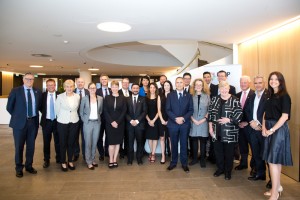 Supplied by Good Shepherd Microfinance
Supplied by Good Shepherd Microfinance
Leaders from government, business, education and the community sectors have come together to announce collective action to improve financial inclusion and resilience which could contribute an estimated $2.9 billion per year to gross domestic product (GDP) over a ten-year period.
Twelve trailblazing organisations have publicly released their Financial Inclusion Action Plans (FIAP), detailing specific steps they will take to improve financial resilience for large numbers of people experiencing financial exclusion, especially women.
“These plans include measures and investments that will build financial inclusion and resilience for everyone – be it through product development, education or employment. These measures have a particular focus on reducing gender inequality and will have tangible outcomes,” said Delia Rickard, Deputy Chair of the ACCC and Independent Chair of the FIAP Advisory Group.
“It’s fitting that these trailblazing organisations are releasing their plans on International Day for the Elimination of Violence Against Women, because new measures to assist women experiencing family violence is a common theme across the trailblazer organisations,” said Ms Rickard.
Good Shepherd Microfinance was appointed by the Australian Government to develop the FIAP program, and elected to partner with EY and the Centre for Social Impact to implement it.
Adam Mooney, CEO of Good Shepherd Microfinance and Chair of the FIAP Partnership Group, said financial modelling showed that the plans could also generate government savings of $583 million and lift household wealth by $11.8 billion.
“A Financial Inclusion Action Plan is a blueprint for how an organisation is going to make a difference to people in Australia experiencing financial exclusion and hardship. It contains specific, measurable actions an organisation will take to advance financial inclusion, with a particular focus on women and girls,” said Mr Mooney.
“There are two million people in Australia experiencing a severe level of financial stress. This economic modelling shows that, by working together, we can enable large numbers of people to reduce their financial stress and build their longer term resilience,” he said.
The 12 trailblazers have collectively committed more than 240 actions that will be officially launched at the Resilient Women Summit, hosted by Good Shepherd Microfinance. The Summit brings together financial resilience experts from Australia and abroad, to improve the financial resilience of women. Importantly, the Summit will also hear from women willing to share their personal stories.
Christine Nixon APM, Chair of Good Shepherd Microfinance, said that financial inequality follows women their entire lives.
“Girls receive 11 per cent less pocket money than boys, women earn 16.2 per cent less than their male peers and retire with just over half the superannuation of men,” said Ms Nixon.
“We plan to use this opportunity, when everyone is in the room, to focus on outcomes. What each of us can do now to improve the financial resilience of women. The headline statistics and the anecdotes I’ve heard from women tell the same story – inequality permeates the lives of women.
“Every woman has a story about a time when a business treated them differently because of their gender. For me it was the bank refusing to give me a mortgage unless my father went guarantee – despite my stable income and a clear capacity to repay,” said Ms Nixon.